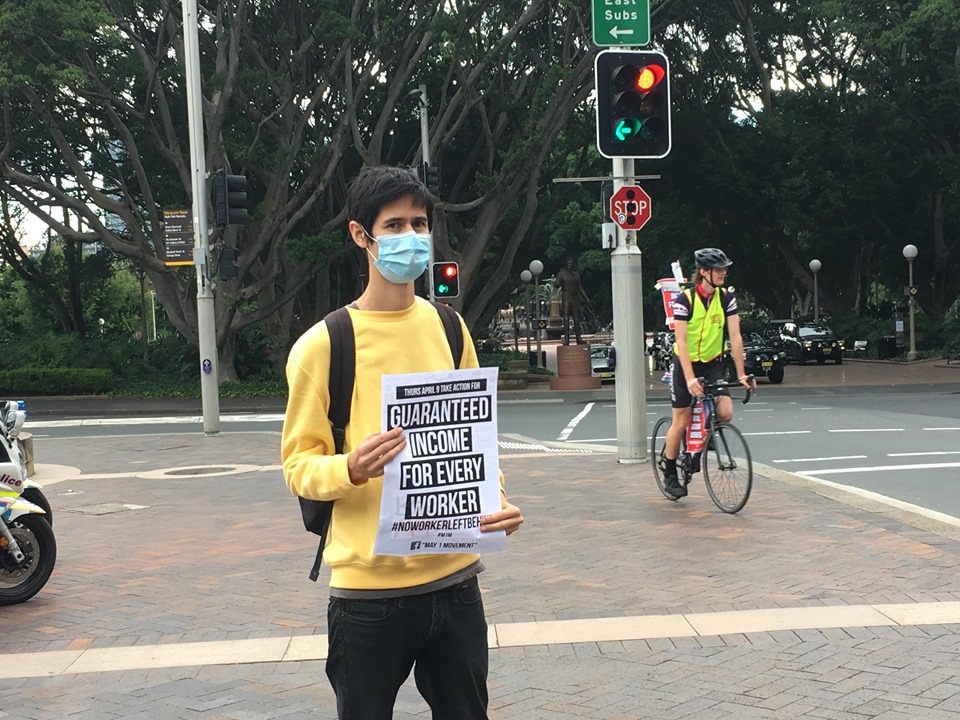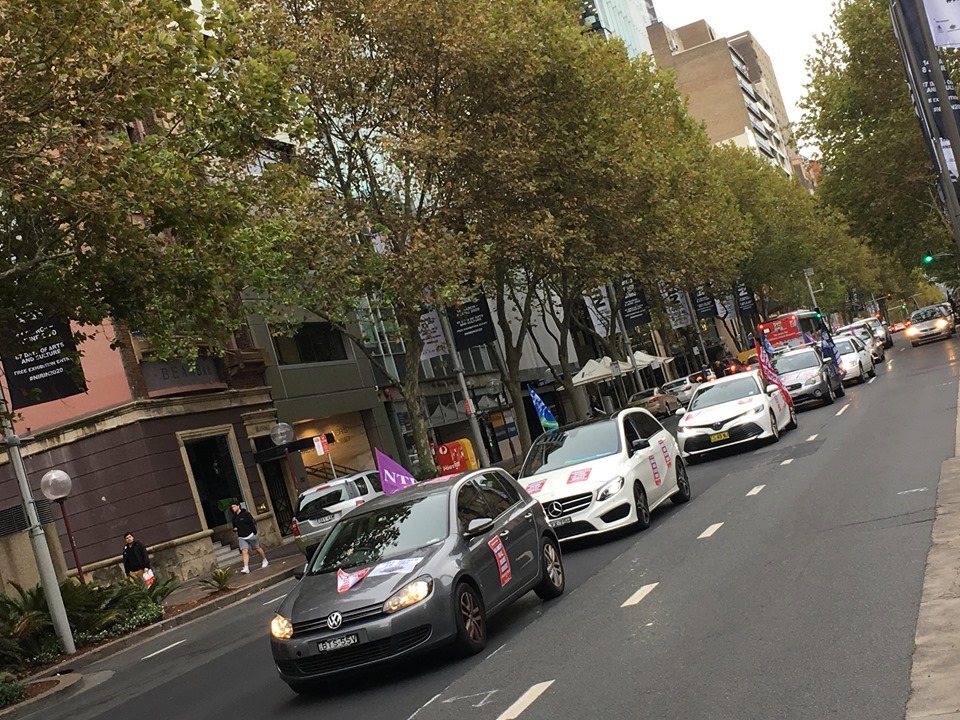Just after 4 pm on 10 April, a cavalcade of around seventy vehicles decorated with trade union signs and protest placards made its way through Sydney's CBD to drive past NSW parliament, calling for no worker to be left behind as a result of the federal government's COVID-19 wage subsidy package.
Organised by the May 1 Movement, the Maritime Union of Australia Sydney Branch, NSW CFMMEU Construction Division, NTEU NSW, and the United Workers Union, the protest rally was mindful that it complied with social distancing regulations, with only two people per vehicle.
Passed last Wednesday, the JobKeeper wage package provides eligible employers with $1,500 a fortnight per employee to ensure they maintain their employment during the COVID-19 shutdown. However, the scheme neglects to include over 2 million of the nation's most vulnerable workers.

As the car cavalcade drove down Macquarie Street on Thursday, drivers honked horns, as a strong police presence looked on.
Leading up to the rally, there had been concerns around whether the law would shut it down, via the enforcement of steep penalties that now apply during the pandemic.
And while NSW police agreed to allow the procession to proceed, the fact that it was ever in jeopardy raised questions around a wider national debate about whether health emergency regulations should be used to stifle the right to protest.
No worker left behind
"We were protesting because there are 2.2 million workers not covered by the wage subsidy," said Rachel Evans, who represented the Socialist Alliance in the cavalcade. "They are visa workers, migrant workers, all the international students, and gig workers."
"And casual workers who've been working for less than 12 months at a company don't get the wage subsidy either," the activist told Sydney Criminal Lawyers. "So, they're all workers who are very vulnerable."
Evans maintains that it's important to continue to demonstrate during the pandemic, as there are certain issues that need to be addressed now. And she pointed out that the cavalcade didn't end at the NRMA's CBD office as originally planned, because of the success of another rally the week prior.
"We did another car cavalcade a week ago outside the NRMA headquarters at Olympic Park, demanding better termination pay for the casual workers that they'd sacked," Ms Evans explained, adding that the company had since complied with the protesters' demands.
Talking over the phone from her car on the way home from the car protest, Evans remarked that the police presence at the rally had been "menacing". "There was a huge amount of coppers in cars and vehicles, eyeballing us and taking photos."

A mounting police state
May 1 Movement organiser Robert Car explained on the morning after the event that NSW police said it wouldn't be fining those taking part in the protest rally as long as they agreed not to bring their vehicles to a standstill during the demonstration.
At 10.20 pm on 30 March, NSW health minister Brad Hazzard imposed the Public Health (COVID-19 Restrictions on Gathering and Movement) Order 2020. It prohibits being outdoors without a reasonable excuse, as well as congregating with more than one person out in public.
These laws are now being enforced by NSW police officers, who can issue individuals that breach the rules with $1,000 on-the-spot fines, or if they decide to arrest an individual and send them before the courts, the maximum penalty is six months prison time and/or a fine of $11,000.
"We need to be able to protest at this point when the government is introducing draconian anti-democratic laws, fining people for sitting on public benches, and trying to stop us from protesting for the rights of the most vulnerable," Ms Evans made clear, "because that's how history is made."
A misapplication of law
Part of the reason there was so much concern around the Sydney protest being brought to a halt was due to a similar car demonstration being prevented in Melbourne last week, as Victoria police threatened participants with harsh fines that apply to restrictions similar to those in NSW.
The Refugee Action Collective (RAC) Victoria was set to demonstrate the continuing detention of around 70 offshore asylum seeker detainees being held at Preston's Mantra Hotel, with no provisions being made to ensure that they can take preventative measures against COVID-19.
Melbourne Activist Legal Support (MALS) has been assisting the protesters. In a statement, it outlined that certain restrictions on freedoms during the pandemic are required, however, as the UN advised, these should be "proportionate, necessary and non-discriminatory".
MALS asserts that activist groups around the country have been "proactive in efforts" to safeguard against the spread of the disease, and the police attempts to stop the event fail to recognise that it was being conducted within the boundaries of the new state edicts.
RAC rescheduled the protest to go ahead on Good Friday. However, Victoria police intercepted the car convoy at 2 pm outside the Mantra Hotel in full view of the refugees inside. One of the organisers was arrested and charged, while officers took the names of all other drivers.

The issue is police discretion
Erin Buckley is a founding member of MALS. She explained that stopping the protesters with fines when they were doing everything to prevent the spread of COVID-19 was a misapplication of the law.
"It's my view that if people are fined under these laws when protesting, they should consider contesting the fine," Ms Buckley told SCL.
"It's highly likely that if the laws are being used in a way not consistent with the purpose of protecting public health, the fine could be withdrawn or dismissed."
The lawyer further set out that the key issue around the new laws is that their application rests entirely on police discretion, so like all public order offences, they're likely to be used in a manner that targets particular groups, such as the homeless, First Nations people, youths and activists.
"We need to maintain our civil and political rights under all circumstances," Ms Buckley concluded. "There will be necessary curtailments in order to protect public health, but any powers that pertain to public health need to be read narrowly, so they're not being used for any other purpose."
The content of this article is intended to provide a general guide to the subject matter. Specialist advice should be sought about your specific circumstances.

